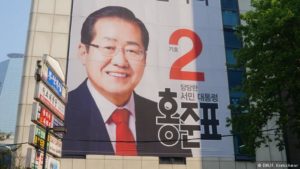by WorldTribune Staff, May 8, 2017
The conservative candidate is making a last-minute comeback in a bitter presidential election showdown in South Korea.
The latest polls show conservative candidate Hong Joon-Pyo surging, according to media reports in Seoul and the Wall Street Journal. “About 20 percent of the electorate is still undecided, and an upset is possible if center-right voters rally around a single candidate,” the Journal reported.

In demanding that Seoul pay for the THAAD missile defense system, U.S. President Donald Trump gave an “undeserved boost” to South Korea’s leftist presidential candidate, Moon Jae-In, who is “partly responsible” for North Korea’s success in developing its nuclear weapons program, analysts say.
The U.S. has since walked back Trump’s comments, with national security adviser H.R. McMaster confirming the U.S. will pay for the $1 billion system as originally agreed.
According to Google Trends, search traffic for Hong has spiked in the closing days of the campaign according to a report by the Korea Times.
Young liberal South Koreans and hard core left-wing activists rallied last year for the impeachment and ouster of conservative President Park Geun-Hye, and Moon has appeared to be riding that wave to power and the presidential Blue House according to mainstream media reports in South Korea.
“There is no small irony because Mr. Moon is partly responsible for the North’s success in developing nuclear weapons and the missiles to deliver them,” the Wall Street Journal reported.
“He was the chief of staff to the late President Roh Moo-Hyun, who in the mid-2000s gave Pyongyang the opportunity to earn $100 million a year in hard currency in the Kaesong Industrial Zone. The zone closed in 2016, and Mr. Moon has pledged to reopen it,” according to the report.
The international media have largely ignored the critical May 9 election in South Korea to replace Park despite its potential impact on the balance of power between the U.S., China, North Korea, South Korea, Russia and Japan in strategic and resource-rich Northeast Asia .
Except for Stalinist North Korea, five of those nations are leading military or economic world powers.
Writing for The Washington Times on May 7, Peter Kang, president of the Korea Freedom Alliance, noted that support for Hong “is rapidly climbing … but it is very difficult to predict the winner.”
“And that is where the U.S. government, which has not yet taken sides, can play a decisive role and help Hong, for the sake of both South Korea’s freedom and the U.S. interest,” Kang wrote.
“Trump, instead of being neutral, should issue a statement (a few words will do) expressing concern that, if the leftist becomes next president of South Korea, the U.S.-ROK Alliance may be in jeopardy with unavoidable friction between Seoul and Washington, possibly resulting in the withdrawal of U.S. troops.”
Though a high ranking U.S. official said that, no matter who is elected, the U.S.-South Korea alliance will remain strong, “such a statement is kind to the leftists and may be appropriate after the election is over, but is not a smart thing to say when the U.S. must try its best to prevent a pro-North leftist government in South Korea.”
Moon was the chief of staff to the late President Roh Moo-Hyun, who in the mid-2000s gave Pyongyang the opportunity to earn $100 million a year in hard currency the Kaesong Industrial Zone. The zone was closed in 2016, but Moon has pledged to reopen it, according to a Wall Street Journal report.
“Over the past few decades, the leftist ideology has been rising in South Korea especially among the young people and much of the news media,” Kang wrote. “It is now a widely accepted view that nearly half of the South Korean population is considered left leaning and sympathetic to North Korea. Unless we help save the Republic of Korea, the entire peninsula may be at peril.”
The impeachment of Park “was the final product of the long-executed goal of the leftist politicians to end the rightist pro-U.S. government of the last 9 years (Presidents Lee and Park) through well-organized propaganda, agitation and education (by Communist teachers),” Kang wrote.
Meanwhile, “throughout his campaign, Moon has been vehemently opposing the deployment of the missile defense system, THAAD, siding with China’s opposition to it, and has been vowing to reinstate the ‘Sunshine policy’ of former Presidents Kim Dae-Jung and Roh Moo-Hyun,” Kang wrote. “As another campaign promise, Moon plans to release the Communists who are now in prison for having organized an armed revolt against the South Korean military facilities to achieve the socialist revolution.
“Curiously,” Kang added, “even the leftists are counting on the U.S. to protect the South against a possible attack from the North while emphasizing friendship and reconciliation with the Kim Jong-Un regime.”
